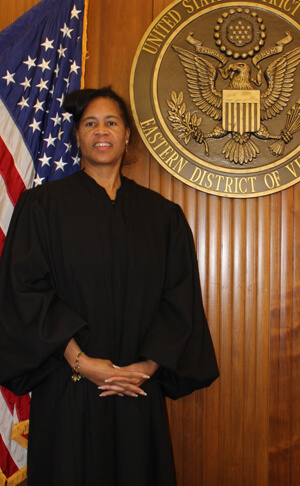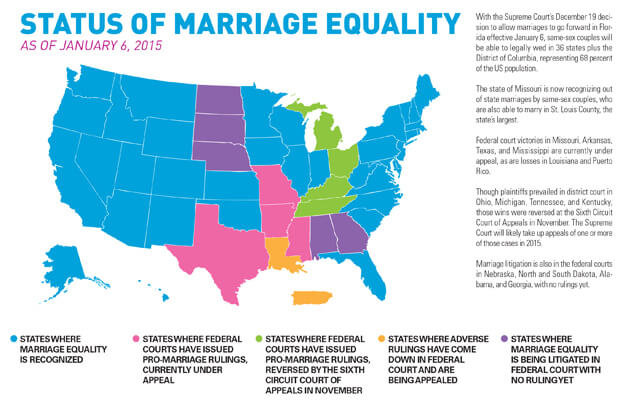Judge Arenda L. Wright Allen. | US DISTRICT COURT/ EASTERN DISTRICT OF VIRGINIA
As anticipation builds for the first federal appellate arguments on marriage equality since last June’s Supreme Court decision striking down the Defense of Marriage Act’s ban on federal recognition of legal same-sex marriages, new developments in litigation efforts across the nation continue to pile up.
On April 10, a panel of three judges of the Denver-based US 10th Circuit Court of Appeals will hear the State of Utah’s appeal of last December’s district court order requiring the state to allow same-sex couples to marry and to recognize same-sex marriages from out of state. That order was stayed by the Supreme Court on January 6 after a 10th Circuit panel refused to issue a stay –– and after more than a thousand same-sex couples had married.
A week later, on April 17, the same three-judge panel will hear the State of Oklahoma’s appeal from a narrower order by the federal court there that required the state to allow same-sex couples to marry but avoided the related question of recognizing out-of-state marriages.
A Baedeker to what’s up in the nation’s appellate courts
Finally, on May 13, the Fourth Circuit Court of Appeals, based in Richmond, will hear oral arguments in an appeal by two county court clerks of another federal district court ruling that ordered the State of Virginia to allow same-sex couples to marry and to recognize out-of-state same-sex marriages.
Arguments have yet to be scheduled for similar appeals in the Fifth, Sixth, and Ninth Circuits (that last being the only one where the appeal is coming from the plaintiffs, who lost at the district court), but there have been developments in some of those cases as well.
Turning to Virginia first, where marriage equality lawsuits were filed in both the Eastern and Western District Courts. The American Civil Liberties Union and Lambda Legal, in the wake of last summer’s DOMA ruling, put out a call to identify suitable plaintiffs to challenge Virginia’s same-sex marriage ban, filing their suit in the Western District. As the litigation groups were carefully assembling their case, two couples living in the Eastern District –– two men seeking to marry and two women wanting Virginia to recognize their California marriage –– went ahead with their own lawsuit.
The American Foundation for Equal Rights (AFER) –– which was formed in 2009 to challenge the constitutionality of California’s Proposition 8 and recruited star appellate attorneys Ted Olson, a former US solicitor general, and David Boies –– took an interest in the Eastern District case. Olson and Boies prevailed over Prop 8 in the district court, but fell short of their goal of establishing a federal right for same-sex couples to marry when the Supreme Court declined to give standing to the only party appealing their victory –– its official proponents. The district court ruling stood, but the Prop 8 victory secured marriage rights only in California.
Looking for a new opportunity to get the issue before the Supreme Court, AFER offered its help to the Eastern District plaintiffs, an offer quickly accepted. Olson and Boies moved their case more quickly than the ACLU-Lambda team did theirs. On February 13, Eastern District Court Judge Arenda L. Wright Allen granted summary judgment in that case. With newly elected Governor Terry McAuliffe and the new attorney general, Mark Herring, both Democrats, declining to defend the state’s marriage ban, the appeal in the case is left to two county court clerks.
In the Western District, where the litigation is still in the pre-trial stage, District Court Judge Michael F. Urbanski certified the case as a class action on behalf of all same-sex couples wishing to marry. This prompted the ACLU and Lambda to petition the Fourth Circuit Court of Appeals to be allowed to participate in the county court clerks’ appeal of the East District marriage equality ruling. Urbanski, meanwhile, issued a March 31 ruling that he would stay the Western District case before him pending the Fourth Circuit’s ruling on the Eastern District appeal.
The Sixth Circuit, meanwhile, has marriage equality appeals pending in all four of the states in the circuit –– Michigan, Ohio, Kentucky, and Tennessee. On April 4, Michigan’s attorney general, Republican Bill Schuette, filed a petition asking that the state’s appeal of the marriage equality victory there bypass the customary three-judge appellate panel stage and go directly to what is called en banc review, which would involve all 15 of the circuit’s active judges.
The Sixth Circuit had already issued an expedited briefing schedule in appeals of marriage equality rulings in Kentucky and Tennessee, as well as in an Ohio case where the district court ordered that an out-of-state marriage by two men be recognized for purposes of one of the men’s death certificate.
Schuette, noting that all four cases are “proceeding swiftly in parallel,” pointed to federal appellate procedures that recognize that some cases are “so significant that they warrant initial hearing en banc.”
“This is such a case,” Schuette argued and then referred to Michigan’s 2004 voter referendum that banned same-sex marriage. “It presents the question whether one of our most fundamental rights — the right to vote — matters, or whether a judge can take an important social issue out of the hands of the voters by concluding it is not something about which reasonable citizens can disagree.”
Schuette may be playing a numbers game here. The Sixth Circuit now has 10 active judges appointed by George W. Bush or his father, three judges appointed by Bill Clinton, and two by Barack Obama, with one vacancy. The en banc court, then, has a 10-5 majority of judges appointed by GOP presidents. A three-judge panel chosen randomly, on the other hand, could conceivably yield a majority of Democratic appointees.
If that is the calculation, Schuette might consider that several of the recent marriage equality decisions in federal court were issued by Republican appointees, suggesting that political affiliations are not a salient factor in how this issue is playing out.
And, of course, the issue ultimately will not be decided by any circuit court of appeals, but rather by the Supreme Court. (Litigation in Oregon may prove an exception to the prospects that the current cases will only be resolved by the high court, since state officials there are declining to defend the state’s marriage ban and, to date, no county clerk has stepped forward to intervene.)
Should the Sixth Circuit move to consolidate all of the pending appeals in Michigan, Ohio, Kentucky, and Tennessee, its ruling would be something special, no matter how it turned out.
One additional factor in the Sixth Circuit involves Ohio, where, on April 4, District Judge Timothy Black announced he “anticipates striking down as unconstitutional under all circumstances Ohio’s bans on recognizing legal same-sex marriages from other states.” He will issue that ruling “on or before April 14, 2014.”
Black last year issued the ruling finding that Ohio had to recognize an out-of-state marriage of two men, John Arthur and Jim Obergefell, when filling out Arthur’s death certificate.
The expected new order would be broader than in the Obergefell case, since it would extend beyond recognition for a specific purpose — a death certificate — to a more general recognition requirement.
There are also interesting developments in the Ninth Circuit, where Lambda Legal is appealing a defeat –– which predated the DOMA ruling –– at the district court in its suit against Nevada’s ban on equal marriage rights. The State of Nevada was defending the case on appeal, but its Republican governor, Brian Sandoval, and Attorney General Catherine Cortez Masto, a Democrat, abruptly changed course in January after a Ninth Circuit ruling in a case involving a sexual orientation discrimination claim regarding jury selection. The issue arose out of antitrust litigation between SmithKline Beecham and Abbott Laboratories over HIV drugs, and the appeals court found that Abbott’s use of a peremptory challenge to keep a gay man off the jury should –– in light of the DOMA ruling –– be subjected to “heightened scrutiny.”
Sandoval and Cortez Masto said that if Nevada’s gay marriage ban were subjected to heightened scrutiny –– which places a higher burden than is typical on the state in justifying its policy –– it could not be defended in court.
Parties that had filed amicus briefs will now defend the Nevada ban, though the state has not formally withdrawn its appeal, perhaps to preserve its right to appeal a Ninth Circuit ruling that strikes down the marriage ban. At the Supreme Court, Sandoval could argue that the demanding heightened scrutiny standard applied by the Ninth Circuit is not appropriate in weighing sexual orientation discrimination claims.
Oral arguments in the Nevada case had been planned for April 9, but were mysteriously cancelled. Since that cancellation, news has surfaced that there is sentiment in the circuit to review en banc the heightened scrutiny ruling in the juror exclusion case. If that ruling were overturned, the state of play in the marriage case would shift back to where it was when the state initially planned to defend its ban.
To further complicate the picture, there is marriage equality litigation playing out in three other states in the circuit –– Arizona and Idaho, in addition to Oregon.
The marriage equality issue, then, is quickly coming to a boil at the appellate level, even as new cases have been filed in recent weeks in other states. We are very close to the point where equal marriage claims are being litigated in every state that does not already allow same-sex couples to marry. As of now, same-sex couples can marry in 17 states and the District of Columbia, and a majority of those states, as well as DC, achieved marriage equality legislatively, not through judicial action.
In addition, of course, the federal government now recognizes same-sex marriages contracted in states where they are legal –– and even if those couples in fact reside in states that don’t recognize their marriage, their unions are treated as valid by the US government to the maximum degree possible.
The tide toward marriage equality appears irresistible, as public opinion polls show majority support in the electorate ––even in many non-marriage equality states and among Republicans under 45. With all the litigation stirring, the issue will likely end up in the Supreme Court next term, so spring 2015 may be when the marriage equality issue is resolved in the United States.






































